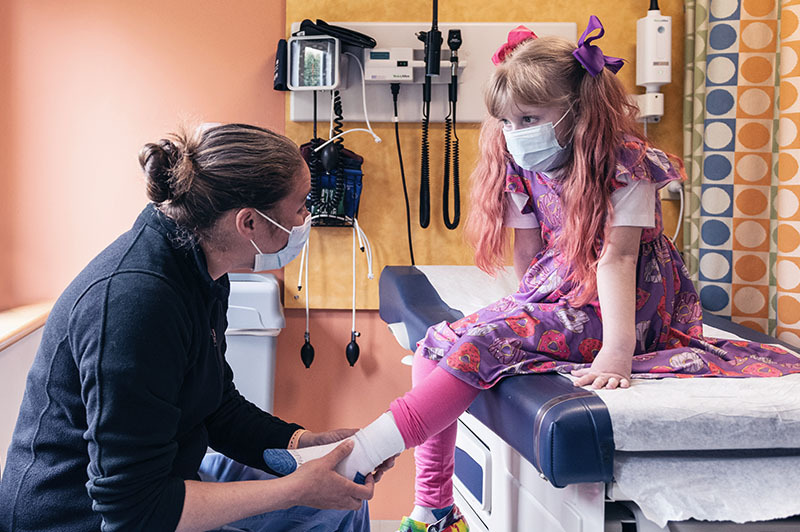Questions to ask about your child’s orthopedic care

Maybe your child has an orthopedic injury and needs surgery, or maybe they need to be treated with a different method. Either way, asking questions can help you understand their doctor’s recommendations and how to prepare for whatever comes next.
“Families often find themselves unprepared for their child’s mobility limitations as they heal from surgery or injury,” says orthopedic surgeon Dr. Kristin Livingston of Boston Children’s Orthopedic and Sports Medicine Department. Yet knowing such details in advance can give you a chance to look into resources that could help your child return to activity (and school) sooner. We encourage families to ask as many questions as they have.
Here, Dr. Livingston suggests questions that can help parents gather information about their child’s treatment, the care team’s experience, and recovery.
Questions about treatment
What’s your experience treating patients who are my child’s age?
“We say this all the time, but kids are not little adults,” says Dr. Livingston, “particularly when it comes to surgery.” For example, children’s bones break differently and heal differently than adult bones. The pediatric orthopedists at Boston Children’s are attuned to subtle differences in patients’ stages of growth. “We treat similar injuries very differently depending on a patient’s age.”
Are there different ways to treat this injury?
In many cases, there’s more than one way to repair an orthopedic issue. Some fractures (broken bones) can heal on their own. Even when fractures require surgery, some can be fixed with a flexible nail instead of a plate and screws. “It’s helpful to know why your child’s doctor is choosing one method over another.”
What surgical risks should I know about?
“There are always risks with surgery,” says Dr. Livingston. “We take every precaution to keep our patients safe in the operating room.” Thankfully, major complications are extremely rare. However, less serious complications, like wound infection or post-surgical stiffness, can take parents off guard. Ask your child’s surgeon what to watch for so you can detect early signs of infection and respond quickly if needed.
Will this affect my child’s growth?
Some growth plate fractures (a break that extends into the soft area of cartilage of a child’s bone where growth takes place) can interfere with the future development of the affected arm or leg. “Whenever there’s a chance of growth arrest, our team will follow the child for a year or more,” says Dr. Livingston. “If we see signs that the limb has stopped growing, we’ll talk with parents about options to address it.”
Questions about the care team
How often do you perform this procedure?
“Orthopedic surgery is a rare event for most families, but it shouldn’t be rare for your child’s surgeon,” says Dr. Livingston. As a referral center for rare and complex conditions, Boston Children’s regularly treats orthopedic issues that many providers seldom, or never, encounter. “Conditions that are unusual in most places are extremely familiar to us.”
Are the anesthesiologists pediatric trained?
The anesthesiologists at Boston Children’s are trained to understand children’s physiology and put children at ease. Before your child has surgery, the anesthesiologist will consider every factor that could affect your child’s health. During surgery, they’ll carefully monitor your child’s oxygen levels, breathing, and heart rate and adjust the medication as needed to keep your child safe.
Questions about recovery
How can I manage my child’s pain at home?
No one wants to see their child in pain, but many parents are understandably concerned about the dangers of narcotic pain medication. “There are a lot of things we can do to avoid or minimize narcotic use in children,” says Dr. Livingston. For instance, many Boston Children’s orthopedic patients go home with a peripheral nerve catheter, a small device that delivers numbing medication to the surgical site as it heals. Other patients don’t need even that. “Many of our patients’ are fine with simple home remedies, like Tylenol or Advil, ice packs, and elevation.”
What physical limitations might delay my child’s return to school?
“Parents don’t always realize how difficult returning to school can be if their child is on crutches or in a wheelchair,” says Dr. Livingston. What if the school doesn’t have an elevator? What if your child needs help going to the bathroom? Ask what limitations your child may have and then call their school to see what resources are available for them.
Will my child need physical therapy?
Physical therapists are often important members of a patient’s team as they recover from injury or surgery. If you know when your child will be cleared to start PT, you can line services up in advance to help your child regain strength and mobility that much sooner.
Ask questions, get answers
Answers to questions like these can help you feel more informed and confident in your child’s care. And since children often have their own questions, getting answers can help reassure your child as well.
Learn more about the Orthopedic and Sports Medicine Department.
Related Posts :
-

Broken signals: Things you may not know about nerve injury
When Dr. Andrea Bauer talks about nerve injuries, she talks about phone cords. A damaged phone cord transmits staticky or ...
-

Uncertainty surrounds ACL treatment decisions in young athletes. It shouldn’t.
It’s an injury once seen mainly in adults, yet it’s become increasingly common in younger patients. From 2000 to 2020, ...
-

Vertebral body tethering: Is it an option for my child?
For years, teens and tweens with idiopathic scoliosis had three treatment options: monitoring, bracing, or spinal fusion surgery. A new ...
-

Limb-lengthening surgery: A look at the pros and cons
Limb length discrepancies, a leg or arm that’s shorter than the other, can occur for a number of reasons. ...





